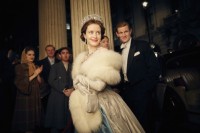By Nicole Fiorica

Several weeks ago at the Golden Globes, the new Netflix series “The Crown” picked up two Golden Globes for best TV Drama and best actress in a TV Drama. Though not as widely followed as fellow nominees like “Game of Thrones” or “Stranger Things,” the series, which depicts the early years of the reign of Queen Elizabeth (Claire Foy), is no less impressive with regard to its huge production value and fantastic acting.
“The Crown” is a bit like a combination of “Downton Abbey” and “House of Cards,” in the sense that it is very British, very beautifully shot and very focused on the highest tier of society and at the heart of what should or could be a political drama, it is actually an examination of a marriage.
The series begins with Elizabeth’s marriage to Philip Mountbatten (Matt Smith, “Doctor Who”), Duke of Edinburgh. While they are constant partners throughout the series, they are also often at odds as Philip struggles to be second to his wife, the queen. After a certain point, the viewer wants to shake Philip for his constant moping and obliviousness. For a drama that takes place in the 50s, it is interesting to see the show take this conflict by the horns and work through what their unconventional relationship might have been like.
This is not all to say that there are no politics in “The Crown.” Featuring Golden Globe-nominee John Lithgow as Prime Minister Winston Churchill, the show explores the post-war political interests of the British government and how those interests conflict with the Queen’s. This exploration reveals one of the show’s weaker points: that British sovereigns simply do not have a lot of power to do almost anything of importance except vaguely influence public and government opinion.
So when Churchill and Elizabeth are at odds, the show is often about matters that can appear trivial at best. Much of Elizabeth’s personal story is about figuring out what her job actually entails and how to wield the power she does have, instead of pretending that it really matters to the audience whether or not Prince Philip is allowed to take flying lessons.
“The Crown” shines most when it details events that may not be well-known to the (American) viewer. By far one of the strongest episodes of the series, “Act of God,” depicts a smog that consumes London for several days, bringing daily life to a halt and causing thousands of deaths from smoke inhalation and traffic accidents. As Churchill fails to realize the gravity of the situation, Elizabeth is forced to consider asking him to step down.
If you, like me, are not an Anglophile, you may find yourself Googling all sorts of people and events as they unfold over the course of the series, and my most frequent thought as I watched was, “Did this really happen?” As with any historical drama, it is best to assume that creative license was taken in many respects, but that does not make it any less entertaining to watch it play out on screen.










































































































































































































